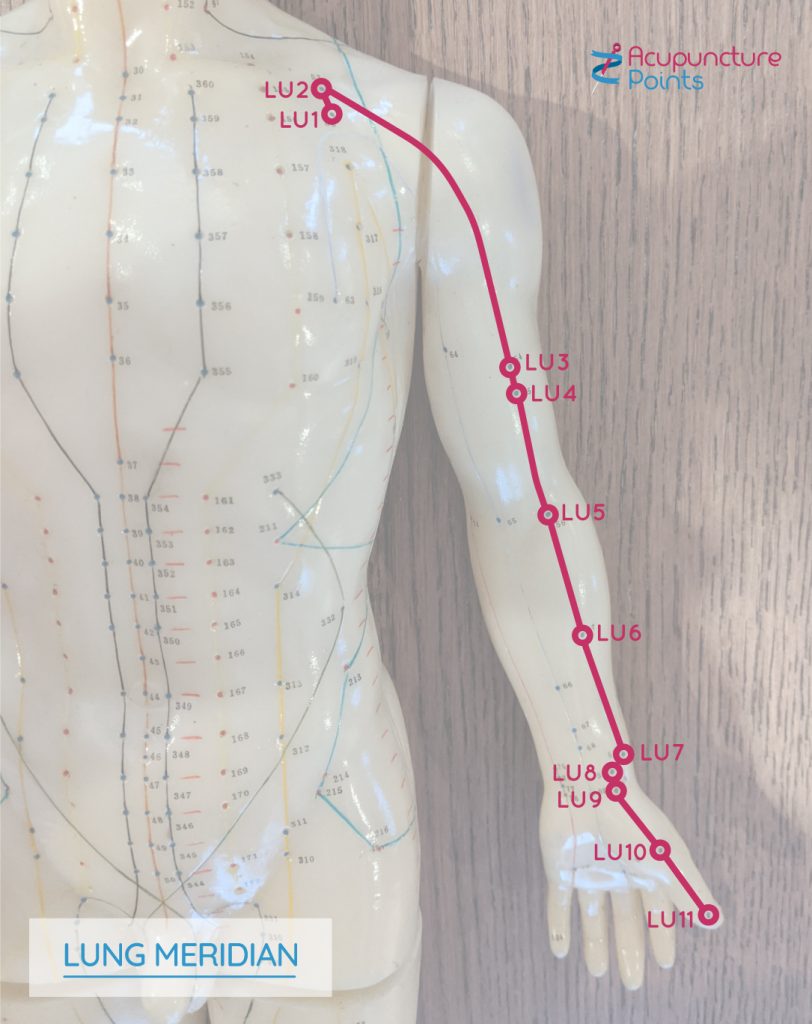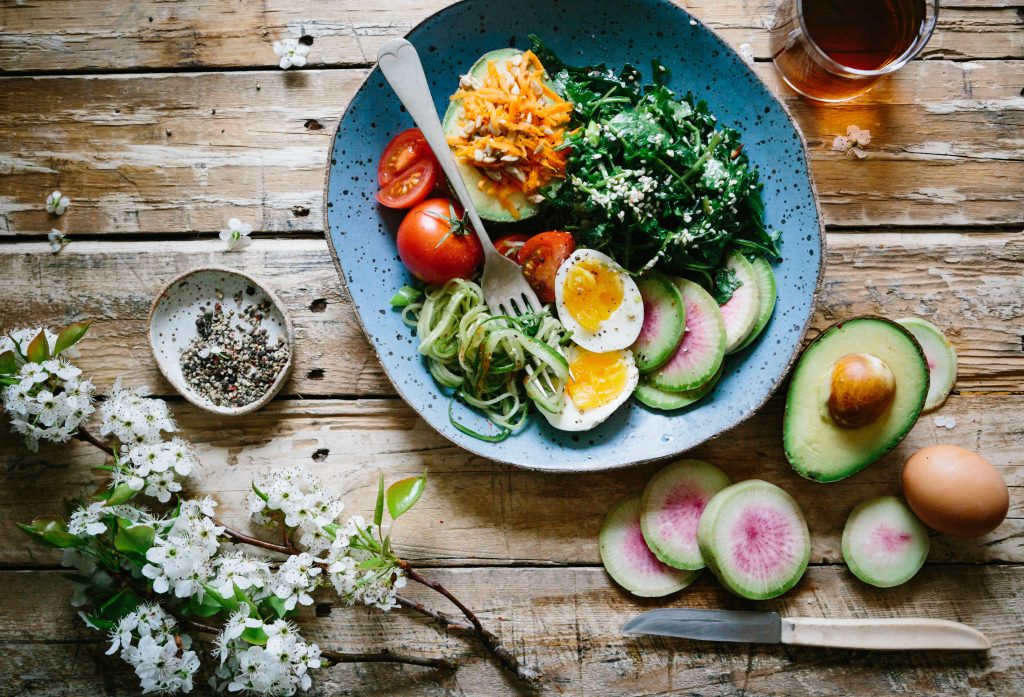Subscribe to the Newsletter
If you are interested in understanding how Traditional Chinese Medicine can improve your life sign up to my newsletter for the latest updates.

Key Learning Points
What is Lung Yin?
How do you keep ‘cool’ when life stresses? How do you tell your friends to calm down if they’re getting angry? (… “Let’s all just take a few deep breaths and then we’ll discuss it…!”)
Where do Yoga teachers tell you to breathe from?
Where do you concentrate your mind when you’re meditating? (Not in all, but in many kinds of meditation.)
Each of those questions is easy to understand when you understand Lung Yin. Of course, you need to know about Lung Qi as well so take a moment to check that too.
The Lung channel has various pathways, including a Primary (of which only the surface points are shown, see picture) and a Divergent channel.
Surprisingly, the Primary Lung channel doesn’t actually begin in the lungs! It starts further down, in the upper abdomen near the stomach, very near the point Zhongwan CV12.
From there, it goes further down, to below the umbilicus, to a point known as Dantien, or Qihai CV6.
So the first direction in which Lung energy works is downwards, and it connects with these two important points along the path of its channel.
Qihai is the point Dantien that people say you should concentrate on when meditating. (Not in all forms of meditation, however.)
It’s also the place you try to use when doing Yoga-type deep breathing. Sending your mind down to this point can have a deep, calming effect, when you know what to do.
But also, taking deep breaths sends energy down there, combating the rising energy from stress. (Stress? What are the symptoms of stress? Well, usually they ascend, giving you tense shoulders, furrowed brow, restless fingers, biting your lips …! Read more about this under Qi Stagnation and my book on it.)
Although made up of empty space, your lungs keep you alive. You can do without almost every other major organ – though not your heart! – for a while, but without your lungs you’re dead within minutes.
They generate Qi for you – read about what that does at Lung Qi.
Working with your Kidney energy, to which Qi is descended when you breathe, you can stay calm and alert. They moisturise your skin and hair, and they regulate what are called your Water passages.
These functions are Yin functions: calming, moisturising, cooling. Your skin is flexible and toned, your voice stable, your mouth and throat are moist, and your energy steady.
The Lung energy also controls your Qi between 3am and 5am, indeed, in some ways up to 7am. That helps with your sleep patterns.
What happens when your Lung Yin becomes deficient? Those calming, cooling and moisturising functions weaken, which means they become less efficient – they don’t work so well.
First read up on Yin deficiency causes in general. Then read the following.

Lung Yin deficiency can also arise from other deficiencies, like Kidney Yin deficiency, which usually arises from overwork, and from poor eating habits which caused Stomach Yin deficiency.
From the list above you can see that modern life in ‘developed’ countries, especially where people work in offices all day, predisposes us to Lung yin deficiency conditions. Because of that, we really need to maintain good eating habits and nutrition to compensate. And, of course, we should take enough exercise to make our lungs work regularly without over-straining them.
But there’s more! ….
It can also arise as a result of Lung Qi deficiency, itself caused by long-term Liver Qi stagnation. Why? Because Liver Qi stagnation prevents free movement of Qi.
If someone is all ‘buttoned up’ and doesn’t let himself vent feelings, (venting feelings lets Qi flow through the lungs), the lungs can’t move and expand properly as in good breathing. When Qi doesn’t flow through them Lung Qi stagnates and can lead to Yin deficiency.
This could also happen if someone doesn’t breathe fully the normal way, say during sex or masturbation. Sex usually releases Qi stagnation, but in this case the Lung Qi stagnates and blocks the Lungs which, because sex causes Heat, tend to dry out.

Stay in Touch!
No spam, only notifications about new articles and updates.

Book a Video consultation if you want to know more about your symptoms

Our bodies mostly have an organic tendency to warm up when Qi doesn’t flow properly. So when Lung Yin has been deficient for some time – perhaps for years – an additional factor comes into play, called Empty Heat.
Think of the moisturising qualities that healthy Lungs provide. If, because of deficient Lung Yin, this is absent, then a situation of weak heating occurs.
This is because, by moisturising, the Lungs help to cool, just as on a hot day you can cool yourself by spraying water on your skin. But when there’s no such moisturiser, and you don’t sweat enough, you continue to warm up.
If tempted to visit your doctor with these Empty Heat symptoms, he’ll suspect a low-grade infection and probably offer antibiotics.

If you’ve been coughing for more than a month or so, even slightly and in the evenings, he may want to do more thorough investigations.
Of course it’s up to you whether you go ahead with such investigations. These might include X-rays which are also ‘drying’.
Personally, we’d try to take a holiday (NOT somewhere too hot or dry) where we can take pleasant, not-too-taxing exercise such as swimming or walking. We’d need at least 2 weeks of it.
Why? Because if we’ve been working hard, it’ll take us the first week to relax and calm down. Then we only have one week to recover. That’s not really enough to cure a mild Lung yin deficiency which, make no mistake, is a form of illness. Though mild, it can easily lead on to more serious conditions and in any case it makes you more susceptible to invasions of Wind-Cold and Wind-Heat: coughs and colds.)
And we’d get some acupuncture before and after the holiday.
Think carefully about your diet. Reduce hot foods and increase cooling foods (but eat them hot) and don’t forget to read our page on Nutrition. Chinese medicine is all about balance so don’t over-compensate!

Some herbs and foods that help recover Lung Yin quality include:
Avoid phlegm-forming foods such as dairy products (cheese, milk, cream, even yogurt), sweet food and cold or raw food. These all challenge your Spleen energy.
Your Lungs and your Spleen work very closely and if one goes down, it can bring down the other too. Then you get phlegm after every meal.
Those with Lung Heat enjoy ice-cream because it is cooling and sweet, which both cools and energises you. But …
… Ice-cream is not recommended! – Sorry to be a spoil-sport! It can be too much of a challenge for your Spleen. Too many phlegm-forming foods and you’ll have not just Lung Heat but Lung Phlegm Heat too: you don’t want that! Click here to see why not!
If you get Lung Phlegm-Heat, your family will want you to go straight back to your doctor for more antibiotics (though you should instead go to your acupuncturist!)
Worse, you might get Lung Phlegm Heat with Lung and Spleen deficiency plus your Lung Heat. All the coughing and sleeplessness will almost certainly lead on to more Lung Yin deficiency too. Bad news.
Once you’ve cleared the Empty Heat and mended your Lung Yin deficiency, you’ll be able to make more use of our page on how to understand and overcome tiredness.

Why You get Nervous Stomach Anxiety and How to Handle It. Acupuncture has great ways to help.
Subscribe to the Newsletter
If you are interested in understanding how Traditional Chinese Medicine can improve your life sign up to my newsletter for the latest updates.
Subscribe to the Newsletter
If you are interested in understanding how Traditional Chinese Medicine can improve your life sign up to my newsletter for the latest updates.
2 Responses
The information presented here is the most comprehensive and comprehensible I have yet to find. Thank you for making the meridians and systems of TCM so readable and enlightening!
Thank you MArgaret for your compliments! I have a tendency to Lung Yin deficiency and this page was written to help myself. I’m glad if it helps others.